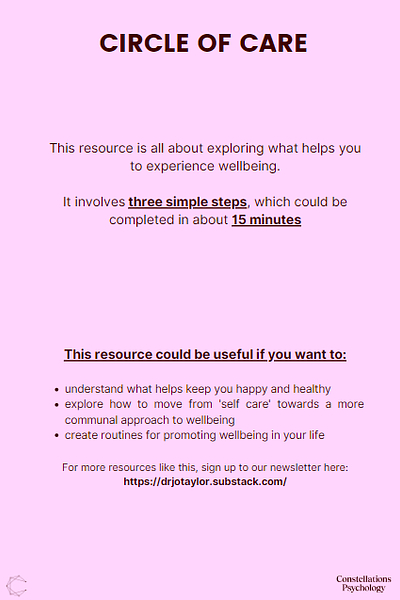RESOURCE: The Circle of Care
Why you can do better than "self care"
Self care, resilience [and me taking umbridge]
“Wait! So candles aren’t the answer?”
In popular culture we talk about “self care” a lot. Normally this is accompanied by a picture of candles - and maybe a bath - and a pithy line about going to bed earlier.
As a psychologist, you might think that I would be on board with this. Now, I love baths and I also like candles, but there is something which doesn't sit right with me when we talk about self-care. Let me explain...
One of the things about being an applied psychologist is that I have to continually refer to the research base, when trying to decide what's going to best for the children family and organizations that I work with. Sometimes this can be tricky because it means changing my mind or adapting my practice. However, I actually quite like it. It helps me feel confident that I'm being useful and that people are spending their time and money in the most efficient way.
So, back to self care. As part of explaining my issues with the concept of self-care we need to take a slightly scenic route. First stop? The resilience research base.
Thinking around resilience has changed a lot over the decades. There are so many articles and books which I could refer you to, but Ann Masten's 2014 book Ordinary Magic has a really nice breakdown of the different phases of thinking around resilience (you can buy it cheaper than Routledge’s price, but I didn’t want to link to a specific book seller, so I hope the search engines are kind to you!) What I will say is: at the moment contemporary research into resilience thinks about it in terms of the ability to access resources and not as a trait. Michael Ungar describes resilience as “a process” and argues that we need to think about it as an ecosystemic phenomenon (and one which needs to be explored across research disciplines). Generally, this definition does not seem to match the usage in popular conversations (among my friends and family, resilience is normally defined as a trait or perhaps a muscle to be exercised).
One of the reasons I find the concept of self care difficult, is that it firmly places the onus on the individual. Look after yourself. Clearly we do need to be looking after ourselves and indeed many of the things which I might suggest as a psychologist will involve the individual. But here comes my point… We often think about self-care when things haven't been going well and when we are feeling overwhelmed. Self-care requires energy and resources. So, we can experience a paradox, where we are asking people to be resourced, reflective and responsible, at a time when they might be least able to to look after themselves.
So what can we do instead?
First up, there are organisations which specialize in helping people develop resilience. One of my favourite organisations has created a wonderful tool called the resilience framework, which help people to explore the protective processes they have in their life and to plan the ones which can be easily introduced. This can be done before we are experiencing negative mental health. It can be celebratory. It can also be used as a flexible tool as our lives change and we develop.
Next, we can change the emphasis. Instead of self care, we can think about collective care, or community care. Which, as their names suggest, focus more on trying to remove the focus from the individual and share it across a group or system. As a psychologist, I find this framing much more helpful, in providing a foundation for conversations with people about how to improve their lives*.
In order to help bring some of this to life - and to help design caring processes which are more sustainable - I created the Circle of Care resource.
The Circle of Care was inspired by therapeutic work I was doing with teenagers (using Cognitive Behavioural Therapy approaches). Since then, I have used The Circle of Care with psychologists, entrepreneurs and international changemakers. Today, I am sharing it with you…
Feel free to download it below, share and use it as you would like. Please let me know your thoughts and questions.
*As a side note, I think it is important to recognise the roots of collective care and community care as concepts. I first read about them in relation to activism in the USA. This makes a lot of sense to me. In the same way that I write about compassion and say: that we need to get up close and personal with suffering, in order to know how to reduce it, or prevent it. Activism deals with perceived suffering, and so it follows that activist thinkers might try to reframe how we think about care:
“Caring for myself is not self-indulgence, it is self-preservation” - Audre Lorde
“rarely, if ever, are any of us healed in isolation. Healing is an act of communion” - bell hooks
I am not a sociologist, or an expert in activism, so please take the above as context. For those of you who are interested in knowing more...
You can hear Patrisse talk about collective care here.
You can watch a Tedx talk on the topic here.



Beautiful piece Jo and I love the simplicity and clarity of the resource - thank you!